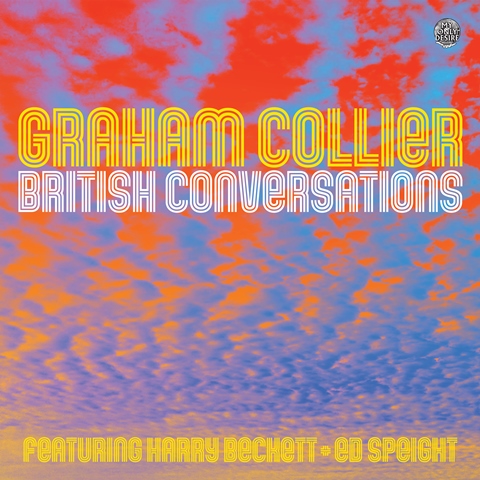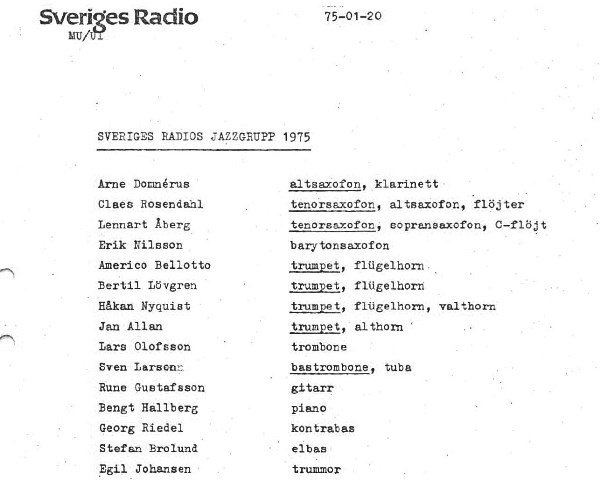Music Reissues Weekly: Graham Collier - British Conversations | reviews, news & interviews
Music Reissues Weekly: Graham Collier - British Conversations
Music Reissues Weekly: Graham Collier - British Conversations
Previously unissued suite enhances understanding of the British jazz composer, bassist and bandleader

Over 1974 to 1978 Graham Collier issued five albums on his own imprint Mosaic. There was another in 1985 and eight releases on Mosaic by other musicians, but for its first four years the imprint was dominated by the British jazz composer, bassist and bandleader’s own work.
He had graduated from Berklee in 1963 and went on, in 1987, to found the first jazz course at The Royal Academy of Music. He died in 2011. While his path can be seen as a series of bullet points – his life and work was gone into by the 2018 biography Mosaics - The Life and Works of Graham Collier – this line of attack makes it hard to get a handle on the essence of Graham Collier. Was he one thing? Another? Or all or some?
 What is certain is that mainstream record labels had not kept hold of him. From 1967 to 1971, there were albums on Deram, Fontana and Philips but he did not settle with one label. It was the same with the musicians he played with. There was Graham Collier and the Collective, Graham Collier Music, The Graham Collier Septet, The Graham Collier Sextet and more. Everything, it seemed, was about exploring and understanding.
What is certain is that mainstream record labels had not kept hold of him. From 1967 to 1971, there were albums on Deram, Fontana and Philips but he did not settle with one label. It was the same with the musicians he played with. There was Graham Collier and the Collective, Graham Collier Music, The Graham Collier Septet, The Graham Collier Sextet and more. Everything, it seemed, was about exploring and understanding.
Entering this whirl is British Conversations, a release dedicated to a never-before issued recording from Stockholm’s Kulturhuset, taped on 27 February 1975. Firmly bracketed within the period when Collier was running Mosaic, what’s heard is a 49-minute suite titled British Conversations which was commissioned by Sveriges Radio. Collier conducts, and his regular collaborators Harry Beckett (trumpet, flugelhorn) and Ed Speight (guitar) play with 15 players from The Swedish Radio Jazz Group (the players are listed below left). British Conversations has five sections. The recording is studio quality and the sole indication this is a live recording is the applause heard at the end.
 Manifestly, this is music where the performance was preceded by forethought, planning and rehearsal. In his accompanying essay, Duncan Heining (the author of Mosaics - The Life and Works of Graham Collier) says that on top of what was issued on record, Collier undertook at least 60 continental European commissions. There’s a lot of lost work out there. For British Conversations, Heining says the contract stipulated 10 hours of rehearsal and a full dress rehearsal before the live broadcast. Collier is quoted on the repetition and the introduction of new melodies in the second section (“Clear Moon”) and noting that, overall, “beneath all the fragmentation a fairly straightforward melody is trying to get out.”
Manifestly, this is music where the performance was preceded by forethought, planning and rehearsal. In his accompanying essay, Duncan Heining (the author of Mosaics - The Life and Works of Graham Collier) says that on top of what was issued on record, Collier undertook at least 60 continental European commissions. There’s a lot of lost work out there. For British Conversations, Heining says the contract stipulated 10 hours of rehearsal and a full dress rehearsal before the live broadcast. Collier is quoted on the repetition and the introduction of new melodies in the second section (“Clear Moon”) and noting that, overall, “beneath all the fragmentation a fairly straightforward melody is trying to get out.”
British Conversations ends with “Mackerel Sky”, its most tense section. Ed Speight steps on his fuzz pedal and employs sustain, nudging himself towards Jeff Beck territory. The contrast between this and the bands ebbing, flowing, percussive rendering of a series of refrains adds to the tension.
While it looks to the weather, British Conversations is more about signifiers of what might be in the offing: the sections are titled “Red Sky in the Morning”, “Clear Moon”, “Halo Round the Sun”, “Red Sky at Night” and “Mackerel Sky”. Rather than specifics, it's concerned with what signs imply. Analogously, this release of a previously unheard, fully formed work by Graham Collier is about what it says about him in this period; what it implies. While little is clear-cut with Collier, British Conversations confirms that nothing can be taken on its own, that something was always just out of reach. Now, this assured music enhances the narrative. Nonetheless, further pieces of the complex Graham Collier jig-saw are still needed to understand the full extent of the picture.
- Next week: Three CDs of The Sun Shines Here - The Roots Of Indie Pop 1980-1984
- More reissue reviews on theartsdesk
- Kieron Tyler’s website
Explore topics
Share this article
The future of Arts Journalism
You can stop theartsdesk.com closing!
We urgently need financing to survive. Our fundraising drive has thus far raised £49,000 but we need to reach £100,000 or we will be forced to close. Please contribute here: https://gofund.me/c3f6033d
And if you can forward this information to anyone who might assist, we’d be grateful.

Subscribe to theartsdesk.com
Thank you for continuing to read our work on theartsdesk.com. For unlimited access to every article in its entirety, including our archive of more than 15,000 pieces, we're asking for £5 per month or £40 per year. We feel it's a very good deal, and hope you do too.
To take a subscription now simply click here.
And if you're looking for that extra gift for a friend or family member, why not treat them to a theartsdesk.com gift subscription?
more New music
 'Vicious Delicious' is a tasty, burlesque-rockin' debut from pop hellion Luvcat
Contagious yarns of lust and nightlife adventure from new pop minx
'Vicious Delicious' is a tasty, burlesque-rockin' debut from pop hellion Luvcat
Contagious yarns of lust and nightlife adventure from new pop minx
 Music Reissues Weekly: Hawkwind - Hall of the Mountain Grill
Exhaustive box set dedicated to the album which moved forward from the ‘Space Ritual’ era
Music Reissues Weekly: Hawkwind - Hall of the Mountain Grill
Exhaustive box set dedicated to the album which moved forward from the ‘Space Ritual’ era
 'Everybody Scream': Florence + The Machine's brooding sixth album
Hauntingly beautiful, this is a sombre slow burn, shifting steadily through gradients
'Everybody Scream': Florence + The Machine's brooding sixth album
Hauntingly beautiful, this is a sombre slow burn, shifting steadily through gradients
 Cat Burns finds 'How to Be Human' but maybe not her own sound
A charming and distinctive voice stifled by generic production
Cat Burns finds 'How to Be Human' but maybe not her own sound
A charming and distinctive voice stifled by generic production
 Todd Rundgren, London Palladium review - bold, soul-inclined makeover charms and enthrals
The wizard confirms why he is a true star
Todd Rundgren, London Palladium review - bold, soul-inclined makeover charms and enthrals
The wizard confirms why he is a true star
 It’s back to the beginning for the latest Dylan Bootleg
Eight CDs encompass Dylan’s earliest recordings up to his first major-league concert
It’s back to the beginning for the latest Dylan Bootleg
Eight CDs encompass Dylan’s earliest recordings up to his first major-league concert
 Ireland's Hilary Woods casts a hypnotic spell with 'Night CRIÚ'
The former bassist of the grunge-leaning trio JJ72 embraces the spectral
Ireland's Hilary Woods casts a hypnotic spell with 'Night CRIÚ'
The former bassist of the grunge-leaning trio JJ72 embraces the spectral
 Lily Allen's 'West End Girl' offers a bloody, broken view into the wreckage of her marriage
Singer's return after seven years away from music is autofiction in the brutally raw
Lily Allen's 'West End Girl' offers a bloody, broken view into the wreckage of her marriage
Singer's return after seven years away from music is autofiction in the brutally raw
 Music Reissues Weekly: Joe Meek - A Curious Mind
How the maverick Sixties producer’s preoccupations influenced his creations
Music Reissues Weekly: Joe Meek - A Curious Mind
How the maverick Sixties producer’s preoccupations influenced his creations
 Pop Will Eat Itself, O2 Institute, Birmingham review - Poppies are back on patrol
PWEI hit home turf and blow the place up
Pop Will Eat Itself, O2 Institute, Birmingham review - Poppies are back on patrol
PWEI hit home turf and blow the place up
 'Fevereaten' sees gothic punk-metallers Witch Fever revel in atmospheric paganist raging
Second album from heavy-riffing quartet expands sonically on their debut
'Fevereaten' sees gothic punk-metallers Witch Fever revel in atmospheric paganist raging
Second album from heavy-riffing quartet expands sonically on their debut

Add comment